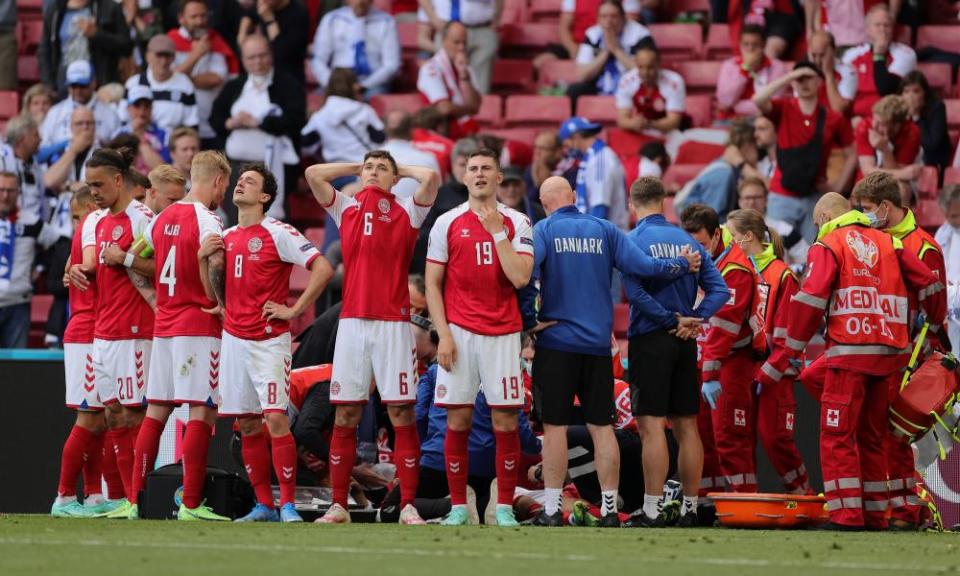Christian Eriksen collapsed and the stadium fell silent in horror

There was something in the banality of the scene that made it especially horrifying. A late afternoon sun shone on the pitch at Parken, where the stands were as full as they can be given Covid restrictions: the majority from Denmark in their red and white, but also behind one goal 3,000 from Finland in white and blue. But the game had stopped. The ground was silent. The match officials stood on one touchline with the managers, and in one corner of the field, Danish players gathered round medics, providing a shield as they attempted to resuscitate Christian Eriksen.
When, after around 10 minutes, the game was formally suspended, there was reason to fear the worst, but a little under an hour after the former Tottenham midfielder collapsed, Uefa released a statement explaining that he had “been transferred to the hospital and has been stabilised.” That is the Rigshospitalet, which stands on the opposite corner of the park to the stadium, just five minutes’ drive away.
Related: Denmark v Finland resumes with Christian Eriksen awake after collapse – updates
There had been early suggestions that Eriksen had been seen raising a hand with eyes open as he was eventually carried from the pitch. A medic was reported to have raised a thumb. Such fragments were optimistic but vague; thankfully within an hour or so of him being taken to hospital, they had taken more concrete form as Eriksen’s manager Martin Schoots told NPO Radio 1 that he was talking in hospital with his wife and father.
It was clear as soon as Eriksen collapsed that something was badly wrong. The ball went out of play by the Finnish corner flag and, as the throw-in was taken, Eriksen went to collect it but fell limp, the ball bouncing off his knee as he slumped to the grass. Instantly, players from both sides called for medical attention, which was summoned by the referee Anthony Taylor.
The doctors ran over to Eriksen and, as it became apparent just how serious the situation was, the stadium fell quiet. Finland’s Joel Pohjanpalo had his head in his hands. Thomas Delaney, the Danish midfielder, used his shirt to wipe tears from his eyes. The Denmark players, stepping back to allow the medics access, initially formed a shield around Eriksen as he received CPR.
Simon Kjær was widely praised for his role in the immediate aftermath of Christian Eriksen’s collapse. The Denmark captain was seen securing Eriksen’s airway, guiding teammates to shield him from cameras, and consoling Eriksen’s partner, Sabrina Kvist Jensen, who stepped on to the pitchside as treatment was ongoing.
The BBC later apologised that footage of Eriksen’s treatment was screened live. Host Gary Lineker tweeted: “I understand some of you would have been upset with some of the images shown (we were too). Obviously these were the host pictures and out of our control. They should have stayed on a wide [shot] of the stadium. Apologies.”
As the efforts at CPR continued, polite, horrified applause broke out from the stands, the mood transformed from excited expectation to sickening anxiety. Eriksen’s wife, wearing a Denmark shirt, came to the touchline and was comforted by the captain Simon Kjær and the goalkeeper Kasper Schmeichel.
Thoughts immediately went to the incident in March 2012 when the Bolton Wanderers midfielder Fabrice Muamba suffered a cardiac arrest during an FA Cup quarter-final against Tottenham at White Hart Lane. Despite the use of a defibrillator on the pitch, his heart stopped for 78 minutes, but he was able to leave hospital a month later. But it was impossible also not to recall Marc-Vivien Foé, who collapsed during a Confederations Cup game between Cameroon and Colombia in the Confederations Cup semi-final in Lyon in 2003. He did not recover and was subsequently found to have been suffering from hypertrophic cardiomyopathy.
The Football Association cancelled a press-conference with Gareth Southgate scheduled for Saturday evening to preview Sunday’s game against Croatia. “Our thoughts this evening are with Christian Eriksen and his family, and all connected with the Danish Football Union,” said a statement.
The sense in Copenhagen was of numb disbelief. For Finland, this should have been a joyous occasion, their first ever game in a major tournament. Denmark, although regular qualifiers for major tournaments, had never previously hosted a match at a finals. Fans of both sides remained in the stadium waiting for news, engaging in a call and response of “Christian” and “Eriksen”.
More broadly, for everybody, this tournament had come to symbolise hope that the Covid crisis is at the beginning of its end, that its staging, a year later than scheduled, would mark a return to something approaching normality. That felt very far away on Saturday evening, although, after consultation with the players, the match to be resumed, Finland going on to win 1-0, with the evening game between Belgium and Russia kicking off as scheduled.

 Yahoo Sport
Yahoo Sport 





































